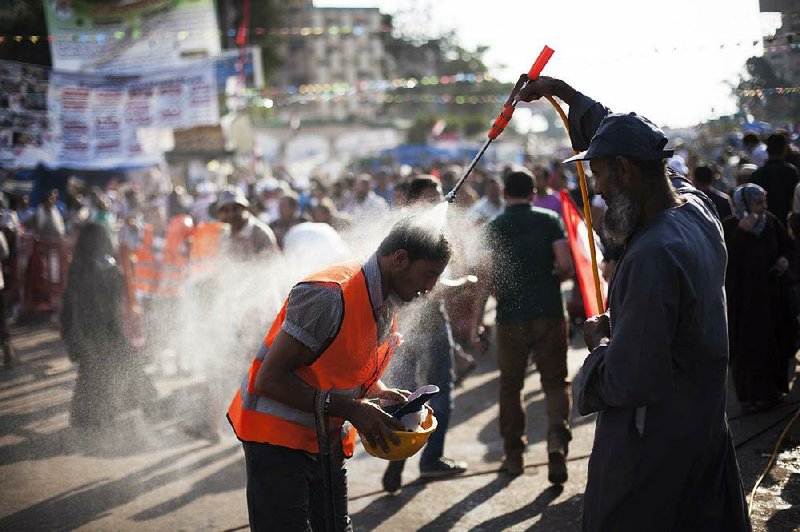CAIRO - Europe’s top diplomat urged Egypt’s interim government to reach out to the Muslim Brotherhood as she worked Monday to mediate an end to the country’s increasingly bloody crisis, while the mainly Islamist protesters calling for the return of ousted leader Mohammed Morsi gathered for more protests.
It was European Union foreign-policy chief Catherine Ashton’s second visit to Cairo since Morsi was toppled by the military nearly a month ago, underscoring the urgency felt after violence that has left more than 260 people dead.
But any hope of political reconciliation appears distant. At least 83 Morsi supporters were killed in clashes with security forces early Saturday near the site of their main Cairo sit-in. Security officials have spoken of taking steps to clear that sit-in and others by Islamists.
So far, Morsi’s Muslim Brotherhood and its allies have rejected any dealings with the military-backed civilian government set up after the army removed the president. They say the only solution is for Morsi to be returned to office.
The government, meanwhile, is pushing ahead with a transition plan that is likely to lead to new elections early next year. At the same time, security officials and pro-military media have increasingly depicted the Islamists’ protests as a threat to public safety because of armed men at the rallies.
Ashton met separately with the two sides. After meeting with Ashton, a delegation of Islamist politicians representing the pro-Morsi camp said those in power must take the first step toward any reconciliation by releasing jailed Brotherhood leaders and stopping media campaigns against Islamists.
“Creating the atmosphere requires those in authority now to send messages of reassurance,” Mohammed Mahsoub, of the Islamist Was at Party, told reporters. “Everyone is looking for a solution. We urge everyone to think … because this is the moment of solutions.”
Undeterred by the weekend’s bloodshed, the Brotherhood gathered supporters for more rallies outside security facilities Monday evening. They carried empty coffins as a symbol of their dead. They also have called for another round of mass protests today under the banner “Martyrs of the Coup” and have set up a tent a block away from their main sit-in for prayers for those killed over the weekend.
The Interior Ministry has vowed to take decisive action against anyone who violates state property, raising fears of more bloodshed.
The Brotherhood has called the clashes Saturday a “massacre.” Human Rights Watch and field doctors interviewed by The Associated Press said many were killed by gunshots to the head and chest. The Interior Ministry said its policemen only fired tear gas, though witnesses say security forces also used live ammunition and birdshot.
Police moved in on the protesters after they sought to expand their sit-in onto a nearby boulevard, blocking it. Security officials said Monday that a police captain died from wounds sustained during those clashes after being hit in the eye with birdshot from protesters. The officials spoke on condition of anonymity because they were not authorized to brief the media.
Late Monday, a dispute ended with the deaths of 15 people in Cairo. A shopkeeper shot and killed two men who spread their merchandise on the ground in front of his store. Their colleagues set fire to the store, killing the man and 12 of his workers, police said.
Also on Monday, 10 prominent local rights groups called for the dismissal of Interior Minister Mohammed Ibrahim, who heads the police forces. Ibrahim was a Morsi appointee who was kept in his post in the newly formed interim Cabinet.
The groups, which include the Cairo Institute for Human Rights Studies and the Egyptian Initiative for Personal Rights, also said that during Morsi’s rule and since his fall, his Brotherhood supporters have engaged in political violence, torture and assaults on peaceful protesters, artists, media personnel and rights workers.
“The political circumstances of the massacre are well known, but the common denominator between it and other similar incidents is the lack of real accountability for the perpetrators of past killings, assassinations, and torture,” the rights groups said.
Ashton said she was emphasizing to all sides that the transition process must include “all political groups, including the Muslim Brotherhood.”
“I will also repeat my call to end all violence. I deeply deplore the loss of life,” she said in a statement before her arrival.
She held talks with military chief Gen. Abdel-Fattah el-Sissi, interim Vice President Mohamed ElBaradei and interim President Adly Mansour. She also met with members of grass-roots, youth-led protest groups such as April 6 and Tamarod. Tamarod, Arabic for “Rebel,” was a main organizer of the mass protests that led to the coup.
After meeting with Ashton, Mahmoud Badr of Tamarod said he asked her to condemn all armed sit-ins.
“We don’t know how responsive the Brotherhood is to this,” he said. “We have no intention of going back one step. … They must break up these sit-ins and hand in their wanted leaders.”
In a snub to his Hamas rivals, Palestinian President Mahmoud Abbas met Monday with Mansour in Cairo in a show of support for the new government. Egyptian authorities have imposed the toughest border restrictions on the Hamas-run Gaza Strip in years, sealing smuggling tunnels and blocking most passenger traffic.
Officials with the Islamic militant group expressed outrage at the meeting. Salah Bardaweel, a senior Hamas official, said Abbas’ meeting is intended to “tarnish” Hamas and “to provide fabricated documents” tying Hamas to a militant attack in Sinai that killed 16 Egyptian soldiers last year.
Information for this article was contributed by Sarah El Deeb and Maggie Michael of The Associated Press.
Front Section, Pages 5 on 07/30/2013

